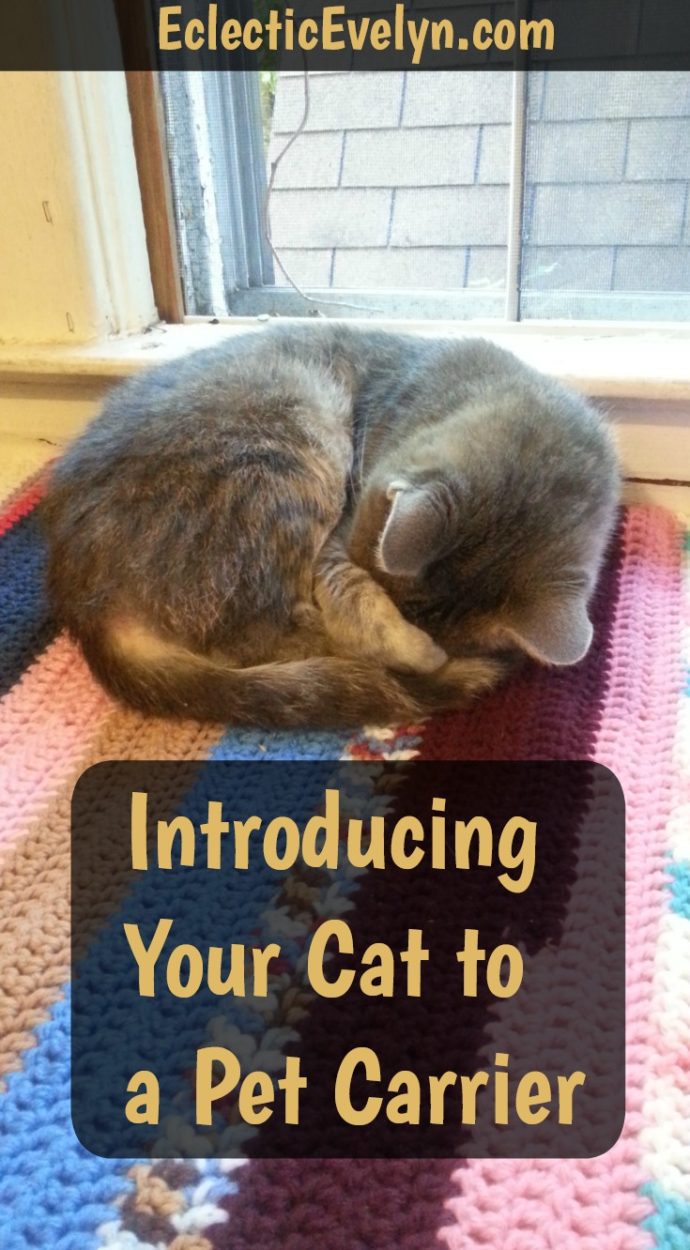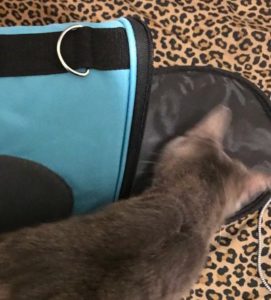Using a pet carrier can be a traumatic experience for cat and owner alike but…
it doesn’t have to be.
By choosing the right carrier and following the steps below, you can help your cat learn to accept being in a pet carrier.

Choose the Right Carrier for Your Cat
The first thing you want to do is choose the right carrier for your needs. There are two basic types of carrier, hard-sided and soft-sided.

To choose the right carrier you must consider
- the size of your cat – weight, and length, as well as the room he likes to have when laying down
- what you will be using the carrier for. For example, if you will be flying with your cat you will need to make sure you purchase a carrier that is airplane approved.
- ease of use – choose a carrier that is easy to clean and store when not in use.
I personally prefer a soft-sided carrier as they are lighter weight and easy to squish to fit into small spaces like under seats. Recently, I had the opportunity to test out the Pet Magasin carrier. I must say, I prefer it to my previous soft-sided carrier. It stores flat so you can put it anywhere and it completely unzips to make cleaning a breeze. I would recommend the Pet Magasin if you are looking to purchase a soft-sided carrier.
Check out this video from Pet Magasin and learn more about this great pet carrier.

Introductions
Cats are very independent and do not like new environments. They have their special spots they like to sleep and don’t like when anyone upsets their routine. Being a cat owner you know this and you want to make sure your little fluff ball feels comfortable when traveling in their carrier. You want your cat to see the carrier as a safe space where she can find comfort. That is why it is very important to familiarize your cat with the carrier well in advance of any travel plans.

Step 1
Make the carrier part of your cat’s everyday life. Put the carrier on the living room floor with the back up against the wall and the door open. Make sure the door is secured open so that it will not close when the cat explores the carrier. You can put a soft blanket, a little catnip, one of your cat’s toys or even a few treats inside to encourage her to explore the carrier. Give your cat a week or two of exploring the carrier and accepting it as part of her daily life.
Step 2
Now that your cat has become familiar with the carrier and no longer sees it as something scary and new. You can begin to close the door for short periods of time while he is in the carrier. Do NOT move the carrier, just shut the door. Start with shutting the door for a minute or two while you are in the room and then opening it for the rest of the day. Then progress to shutting the door for a few minutes while you leave the room. Return and open the door. Remember do NOT move the carrier and only shut the door for a few minutes at a time. You want your cat to feel safe, not trapped. You want him to realize that each time you shut the door you will also open it.
Step 3
Now that your cat has learned that the carrier is a safe space whether the door is open or closed, it is time to move the carrier. Start out by closing the door with your cat inside and picking up the carrier and moving it across the room, sitting it down for a minute and then taking it back to the original spot, open the door and give him a treat. Each day move the carrier a little farther until you are taking your cat for a short walk around your house. You can even venture outside for short walks around your yard or walks to and from the car. Remember each time return the carrier to its original spot, open the door, and give your cat a treat.
Step 4
It’s been three to four weeks since you first introduced your cat to the pet carrier. It’s been at least a week of short little walks around your house with the cat securely in the carrier and now it’s time for a car ride. The sounds of the car may be frightening to your cat so try to keep the windows up and the radio off for the first few trips. The first trip should be very short just around the block and gradually build up to longer trips around town. Remember when you return home, place the carrier back in its original spot, open the door, and give your baby a treat. You want your cat to associate the carrier and the car with something positive not just going to the vet, so make sure you take your cat on car rides randomly not just to the vet or she will start to fear the car and the carrier.

Your cat may never “love” the carrier or riding in the car, but by following the above steps, you can prevent a great deal of trepidation, anxiety, and stress on both your parts. Just remember to be patient and follow your cats lead.
[contentblock id=2 img=gcb.png]






The ones that open from the top – like a box with a lid – can be easier. We just drop Mufasa inside, slam the lid on and then give him some kibbles by way as an apology. They are difficult to find though. Ours came from the RSPCA.
Some great tips here to help your pet! #sharingthebloglove
I love cats, cooked on the BBQ and served with beans and guacamole.
I prefer brats that way lol
I do need to buy another carrier and will check the one you recommended out. Great tips for making it easier on the cat instead of just plopping them in the carrier.
My cat HATES carriers! Your post is great, but alas, my cat will probably not go in a carrier. I had to resort to a large plastic bin made for storage. But I love my Murphy so much anyway 🙂
I wish I’d read this years ago when we had cats! We never managed to get one used to a carrier and we’d have to take him to the vets sat on someone’s lap in the passenger seat! Really great tips to get them aclimatised to it all. Thanks for joining us at #SharingtheBlogLove
Great advice for those with cats! We have a dog so haven’t had this issue. Thank you for joining us at #bigpinklink
I don’t have pets but I can imagine how traumatic it must feel being shoved into a carrier Thanks for introducing your thoughts on how to make your cat feel more comfortable and the types of carriers available. #BloggersPitStop
These are some great tips! My cat is 13 years old, and still hates the pet carrier. He hears the sound of the carrier and runs. I’ve never thought about it before, but carriers can be traumatic for cats.
Thanks. It does help a great deal if you start getting them used to a carrier when they are a kitten.
This is something I’ve always had trouble with with my cats! Allowing the cats to explore the carrier and making it normal to them is a great idea.
For most cats, they only see the carrier when they are going to the vet so they associate it with something traumatic by making it a part of their environment it becomes a safe space.
Great tips! Kati Cat will get inside her carrier without trouble. It’s one of the hard sided ones. She hates our poor vet though. -Marci @ Stone Cottage Adventures
It makes it so much easier when you don’t have to fight them to get them in the carrier.
I like the hard carrier the best, seems like the cat is more stable in it. I appreciate all your tips. They sound like the perfect way to acclimate my cat to her carrier.